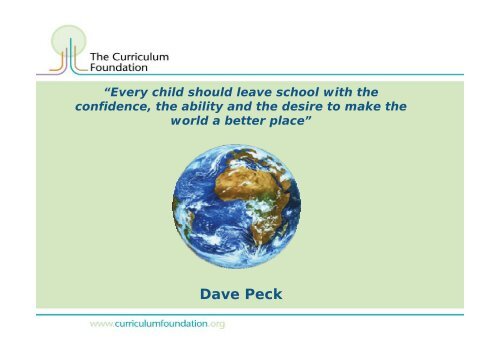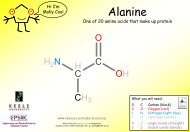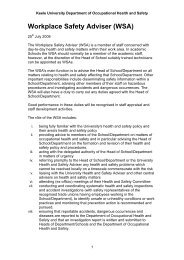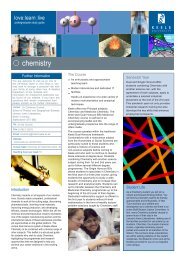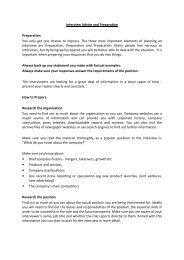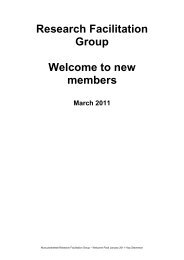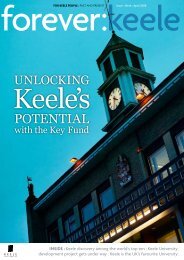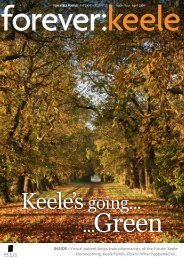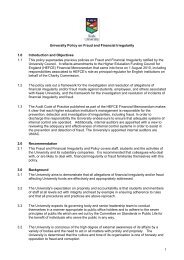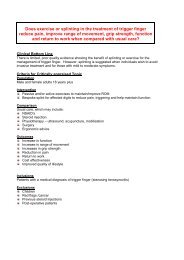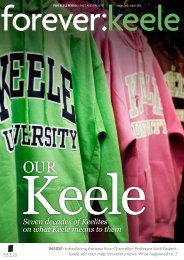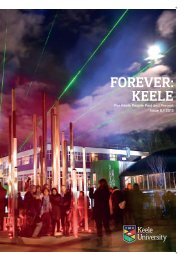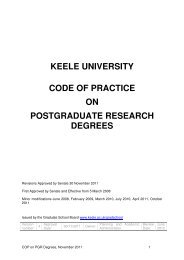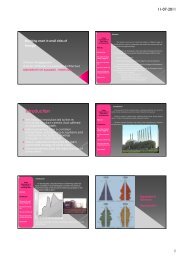David Peck's presentation - Keele University
David Peck's presentation - Keele University
David Peck's presentation - Keele University
You also want an ePaper? Increase the reach of your titles
YUMPU automatically turns print PDFs into web optimized ePapers that Google loves.
“Every child should leave school with the<br />
confidence, the ability and the desire to make the<br />
world a better place”<br />
Dave Peck
Your<br />
Task<br />
Give one example of something you<br />
learned in your school days which<br />
has remained firmly in your memory<br />
ever since.<br />
What was it about this particular<br />
learning experience that made the<br />
learning so effective?
Think of the<br />
curriculum as a<br />
forecast of<br />
possibilities within<br />
an arena of<br />
opportunities<br />
Carla Rinaldi
It’s bad and it’s getting worse<br />
What comes next??<br />
“… standards in writing and mathematics are<br />
declining because young people are spending too<br />
much time…<br />
… listening to the gramophone.”<br />
The Times 1912
“ We have an<br />
education system that<br />
elevates the<br />
acquisition of skills<br />
over the passing on of<br />
concrete knowledge.”
“The Government believes that recent<br />
changes to the National Curriculum, such as<br />
the inclusion of skills development and the<br />
promotion of generic dispositions, have<br />
distorted the core function of the National<br />
Curriculum and diluted the importance of<br />
subject knowledge.”
Do skills matter?<br />
‘Our research suggests that it is not so much the<br />
average level of education in a country which matters<br />
most for social cohesion, but rather how the skills<br />
acquired are spread around.’<br />
‘The more unequal the skills distribution among adults,<br />
the higher the rates of violent crime and civic unrest,<br />
and the lower the levels of social trust and civil<br />
liberties.’<br />
Prof Andy Green (Education, Opportunity and Social Cohesion report ‐ LLAKES 2011)
Do skills matter?<br />
• Business is on the mend – and skills is a key<br />
driver…….<br />
• Almost half of employers report problems with<br />
literacy<br />
and numeracy skills………<br />
• …….businesses’ top priority for schools and<br />
universities is the development of employability the<br />
fundamental attributes of teamworking, selfmanagement<br />
and problem-solving.<br />
John Cridland<br />
CBI Director General<br />
Education and Skills Survey 2011
Do skills matter?<br />
“PISA tests students’ ability to apply their<br />
learning to think critically, solve problems<br />
and make judgements”<br />
“Japan responded by moving away from a<br />
narrow knowledge‐based curriculum and to<br />
focus more on skills and broader<br />
understanding”<br />
“The top 20% of British students do as well as<br />
the top 20% anywhere in the world”<br />
Andreas Schleicher<br />
Head of the "Indicators<br />
and Analysis Division" of PISA
Knowledge v Skills<br />
• Think of a role which does require<br />
knowledge but does not require<br />
skills<br />
• Suggestions?<br />
• An oracle?<br />
• An encyclopaedia?
A ‘not-for-profit’ voice for the whole curriculum - at a time<br />
when it needs a strong voice<br />
Core beliefs in the value of the curriculum in enabling all<br />
young people to enter adulthood with confidence, ability and<br />
desire to make the word a better place<br />
Advisory Panel of: Lord Puttnam, Baroness Estelle Morris,<br />
Prof Mick Waters, Prof Sir Tim Brighouse; Prof Sir Ken<br />
Robinson, Annika Small, Sir John Jones, Tony Mackay, Phil<br />
Revell, Dr Brian Male<br />
Promoting a wide, engaging and inspiring curriculum through<br />
conferences, workshops, projects, research and materials
Pupil of the future<br />
Teachers of the future
But could it be this ....?
1) Do we have the scope to design our own<br />
curriculum when we have a national one?<br />
2) How do we put it all together?<br />
3) Where do we start?<br />
4) Will it work?
How can we design our<br />
own curriculum when it<br />
takes all our time to<br />
cover the national one?
What flexibility do we have?<br />
•Year 2: The medical model<br />
•Year 2: The flat‐pack approach
Do we sometimes forget ...... ?<br />
“It is up to schools which aspects of the curriculum they do<br />
in depth - some they might cover in an afternoon...”<br />
QCA schemes of work are not statutory and were intended<br />
for illustration and guidance.<br />
Schools do not have to teach every subject every week,<br />
nor even every term or year<br />
Schools do not have to teach the curriculum in subjects at<br />
all
The ‘big picture’ of the<br />
curriculum<br />
Pupils learn all the time at school (whether<br />
we want them to or not!)<br />
The curriculum is about:<br />
•lessons<br />
•routines<br />
•events<br />
• out of school<br />
•ethos<br />
• relationships
So the question is:<br />
What will we do with<br />
all the extra freedom<br />
Tim and his team<br />
are going to deliver?
Why are countries all around the world<br />
reforming their national curriculum?
Is our curriculum fit for the 21 st Century?<br />
1905<br />
English<br />
Arithmetic<br />
Science<br />
History<br />
Geography<br />
Foreign language<br />
Drawing<br />
Physical Exercise<br />
Music<br />
Manual training<br />
Housewifery<br />
1989 –<br />
English<br />
Mathematics<br />
Science<br />
History<br />
Geography<br />
MFL<br />
Art<br />
Physical Education<br />
Music<br />
DT<br />
ICT
Lessons From Top ‘PISA’ Countries<br />
Finland<br />
“The curriculum must respond to the<br />
changing knowledge and skills needs in<br />
society and in the world economy.<br />
It must develop the capacity for high<br />
quality life-long learning.”
Lessons From Top ‘PISA’ Countries<br />
Victoria, Australia<br />
The curriculum must reflect<br />
the skills and competencies<br />
that young people need for<br />
the 21st Century
Lessons From Top ‘PISA’ Countries<br />
New Zealand<br />
Key Competencies<br />
• Critical thinking and problem<br />
solving<br />
• Using languages, symbols and<br />
texts<br />
• Managing self<br />
• Relating to others
Lessons From Top ‘PISA’ Countries<br />
Singapore<br />
21 st Century Competencies<br />
• Civic literacy, global awareness<br />
and cross-curricular skills<br />
• Critical and media skills<br />
• Information and communication<br />
skills
Lessons From Top ‘PISA’ Countries<br />
Singapore<br />
Social and Emotional<br />
Competencies<br />
• Self-awareness<br />
• Self-management<br />
• Social awareness<br />
• Relationship management<br />
• Responsible decision making
Curriculum Plans in Other Countries<br />
Student Competencies<br />
1)Thinking and learning skills<br />
2)Personal and social skills<br />
3)Participation in culture, society and<br />
the environment
How can we build all<br />
these skills and<br />
competencies into a<br />
curriculum when we have<br />
to cover all these<br />
subjects?
How can we put all these together, capture<br />
imaginations, lift the spirits, and lay the<br />
roots of lifelong learning?
Magnetism
Joining the leaves and roots<br />
• The parish register<br />
• Parliamentary debate<br />
• Victorian map<br />
• Statue<br />
• How big is this hat?
KS1 Geography Programme of Study<br />
a study of:<br />
“a locality in the United Kingdom that<br />
has physical and/or human features that<br />
contrast with those of the locality of the<br />
school”<br />
(QCA Scheme of work: Unit 13 - Year 5)
Benjamin Bloom<br />
Bloom’s<br />
Taxonomy
Bloom’s Taxonomy<br />
Creating<br />
Synthesising<br />
Analysing<br />
Applying<br />
Comprehending<br />
Knowing
Knowledge, skills and ‘generic<br />
dispositions’<br />
Remembering<br />
Comprehending<br />
Applying<br />
Analysing<br />
Evaluating<br />
Creating
Essentials for learning and life<br />
Thinking & learning skills<br />
Personal & emotional skills<br />
Social skills<br />
Essential literacy, numeracy and ICT
The 6 Areas of Learning<br />
.<br />
Science and technology<br />
The Arts<br />
Physical development, health and wellbeing<br />
Historical, geographical and social<br />
English, communication and languages<br />
Mathematics
.<br />
Mathematics<br />
Putting them together<br />
Science and technology<br />
The Arts<br />
Physical development, health and<br />
wellbeing<br />
Historical, geographical and social<br />
English, communication and languages<br />
Thinking & learning skills<br />
Personal & emotional skills<br />
Social skills<br />
Essential literacy, numeracy and ICT
.<br />
Mathematics<br />
A learning matrix<br />
Science and technology<br />
The Arts<br />
Physical development, health and<br />
wellbeing<br />
Historical, geographical and social<br />
English, communication and languages<br />
Thinking & learning skills<br />
Personal & emotional skills<br />
Social skills<br />
Essential literacy, numeracy and ICT
.<br />
Mathematics<br />
Interconnected learning<br />
Science and technology<br />
The Arts<br />
Physical development, health and<br />
wellbeing<br />
Historical, geographical and social<br />
English, communication and languages<br />
Thinking & learning skills<br />
Personal & emotional skills<br />
Social skills<br />
Essential literacy, numeracy and ICT
Your learning experience<br />
• What was it about your<br />
learning experience that<br />
made the learning so<br />
effective?
Planning the school curriculum<br />
Assemblies<br />
Lessons<br />
Local study<br />
School garden<br />
Working with artist<br />
Residential Visit<br />
Subjectfocused<br />
lessons<br />
Themes<br />
Field<br />
study<br />
Community projects<br />
Museum Visits<br />
After school activities<br />
Expertise<br />
of staff<br />
Newspaper<br />
Coaching<br />
Pupil responsibility: routines
A joined‐up curriculum
Will we cope with<br />
extra freedom?
The greatest<br />
barrier to change<br />
is not how to<br />
adopt new ideas<br />
..... but how to<br />
let go of old<br />
ones.
Where do we<br />
start?
Innovation in steps<br />
Eng Ma Sci ICT Hi D&T Ge<br />
New experience<br />
1<br />
New experience<br />
1<br />
New experience<br />
2<br />
New experience<br />
3
Innovation in steps<br />
Eng Ma Sci ICT Hi D&T Ge<br />
New experience<br />
1<br />
New experience<br />
1<br />
New experience<br />
2<br />
New experience<br />
2<br />
New experience<br />
3
Innovation in steps<br />
Eng Ma Sci ICT Hi D&T Ge<br />
New experience<br />
1<br />
New experience<br />
1<br />
New experience<br />
2<br />
New experience<br />
2<br />
New experience<br />
3<br />
New experience<br />
3
But what would Ofsted say?
But what would Ofsted say?<br />
The Ofsted criteria for an “outstanding” curriculum<br />
“The school’s curriculum provides memorable<br />
experiences and rich opportunities for high-quality<br />
learning and wider personal development and<br />
wellbeing. The school may be at the forefront of<br />
successful, innovative curriculum design*. The<br />
curriculum is customised to meet the changing needs<br />
of individuals and groups. Cross-curricular provision,<br />
including literacy, numeracy and ICT, is mainly<br />
outstanding ..”
20 Outstanding Schools<br />
Ofsted Report: ref. 090170 (2009)<br />
• An interesting, stimulating curriculum fundamental to<br />
effective schools<br />
• These schools know pupils well and shape curriculum<br />
around them<br />
• If pupils learn well, no need to teach to the test<br />
• These schools are confident to reject national materials
Will innovation impact on<br />
standards?
Yes!
But do our<br />
goals for<br />
the future<br />
fit with<br />
children in<br />
the here<br />
and now?
Do they need<br />
to be fulfilled<br />
as human<br />
beings in the<br />
present in<br />
order to be<br />
prepared for<br />
the future?
A Charter for Childhood<br />
Are there some<br />
essential<br />
experiences<br />
that every<br />
young person<br />
should enjoy?
Recognising talent and potential
Recognising talent and potential
What should happen<br />
• National Curriculum .... whole curriculum / space for whole<br />
• Performance indicators = positive not perverse incentives…….<br />
• School curriculum planning … starting point = learners’ needs<br />
• ….skills and competencies and knowledge learners need<br />
• ….memorable learning experiences for this learning to take<br />
place<br />
• ….relevant to whole diverse population of England now and<br />
future<br />
• Every child leaves school with the<br />
confidence, the ability and the desire to<br />
make the world a better place
What could happen<br />
• Increasingly irrelevant curriculum<br />
• Performance indicators rule –perverse<br />
incentives<br />
• Curriculum planning subject‐led<br />
• Knowledge overload / skills marginalised<br />
• Route march / Grand National Curriculum<br />
• Learners fail to identify / engage with curriculum<br />
• Learners insufficiently life‐ready & work‐ready
What MUST happen<br />
Every Successful School / Every School Successful!<br />
• National debate / consensus re meaning of<br />
‘successful’ – align KPIs with needs of learners!!!<br />
• Equip every learner for challenging future in the<br />
global economy …work ready & life ready<br />
• National focus on curriculum for future ….. tackle<br />
the hard questions re skills and competencies<br />
• Engage learners in process – learner‐centred<br />
• Engage public –get everyone talking about it
Our Task<br />
Think of the curriculum as a<br />
forecast of possibilities within an<br />
arena of opportunities<br />
Every child should leave school with<br />
the confidence, the ability and the<br />
desire to make the world a better<br />
place
Thank you...<br />
If you want to find out more about more about curriculum<br />
innovation, visit and join us at:<br />
www.curriculumfoundation.org<br />
Follow us on twitter at:<br />
@curriculumfdn ………..patience!<br />
PLEASE GIVE ME YOUR MEMORABLE LEARNING SHEET
Alberta<br />
• language arts<br />
•maths<br />
• science<br />
• community and environmental<br />
awareness<br />
• personal and social<br />
responsibility<br />
• physical skills and wellbeing<br />
• creative and cultural expression
So, are we going back to ‘topics?<br />
Topics and “Anti-Topics”
Topics<br />
Single theme<br />
Fixed time‐frame<br />
Links subjects within<br />
theme<br />
Wide learning objectives<br />
Anti‐Topics<br />
Single theme<br />
Open time‐frame<br />
Link skills to a single<br />
subject<br />
Focused learning<br />
objective
A new direction for the curriculum<br />
Can we reverse the direction of<br />
curriculum planning?
Can we change direction?
Can we change direction?<br />
Simon Sinek<br />
Ted.com


